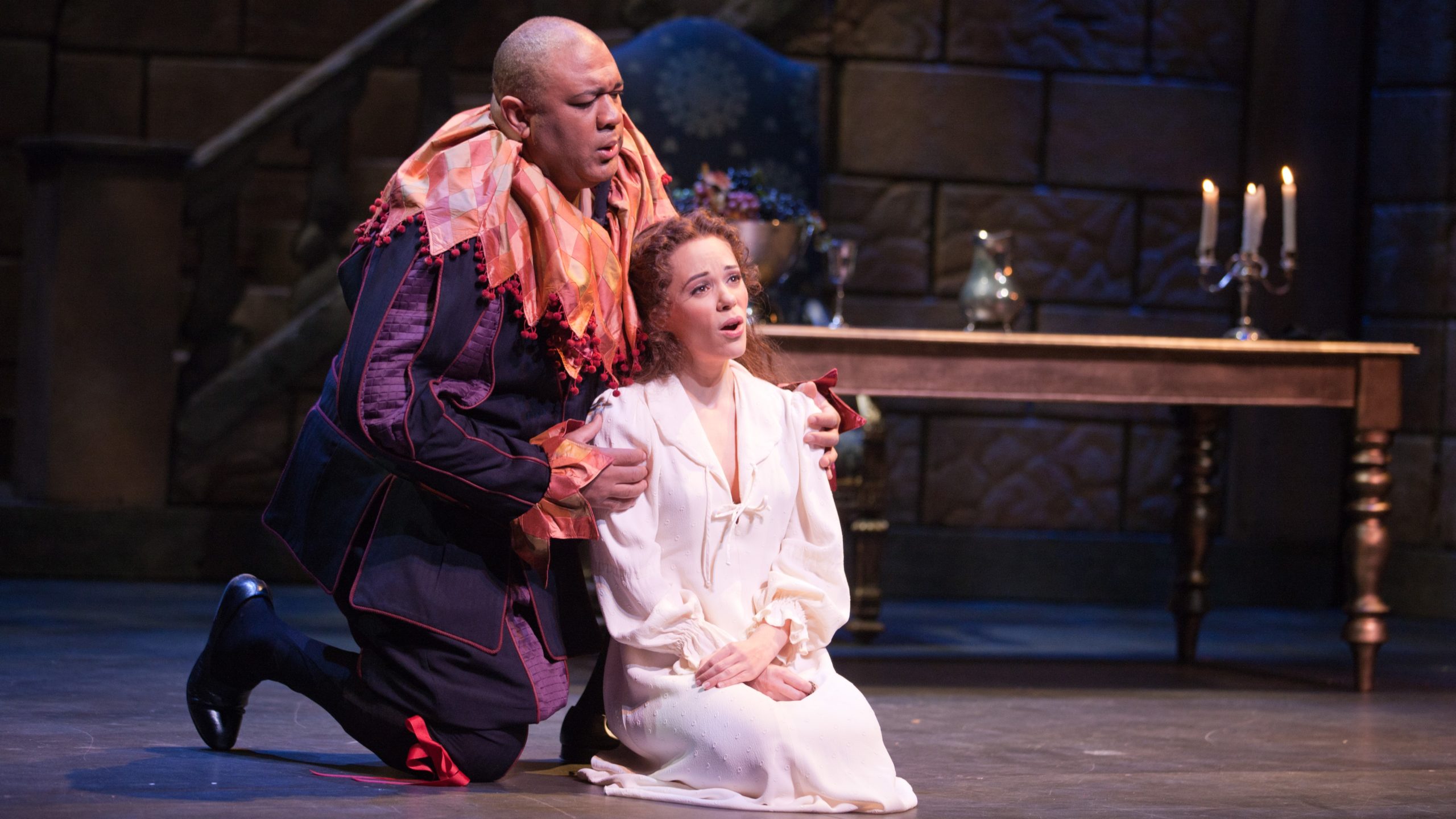Rigoletto 101—Musical Style

Photo: Opera Colorado/Matthew Staver
By: Betsy Schwarm
Many performing arts fans are familiar with the tales of Victor Hugo (1802 – 1885). From Les Miserables to The Hunchback of Notre Dame to Le roi s’amuse (The King’s Diversions), the stories are well-known. If the final title of those three seems at first unfamiliar, give it a new title. In the care of composer Giuseppe Verdi (1813 – 1901), it became the familiar tale of Rigoletto: the court jester who tolerates his licentious employer’s affairs until that employer’s roving eye falls upon the jester’s own daughter with tragic results. Whether presented as Hugo’s play or Verdi’s opera, it makes for high drama.
Trials in Censorship
For both Hugo’s play Le roi s’amuse and Verdi’s Rigoletto, the“high drama” attracted negative attention from authorities. Hugo, whose play premiered in 1832, and Verdi, whose opera premiered nearly two decades later, found censors would not forgive stage entertainment offering a negative portrayal of monarchs. Authorities saw this tale as subversive for its potential to instill distrust amongst the populace. Hugo’s play was banned from the stage after its first performance.
Verdi’s own adventure with censors delayed the opera’s premiere, as authorities demanded repeated changes in the libretto. Rigoletto would not reach the public until March 11, 1851, at Teatro La Fenice. At that point, it seemed to inspire no political revolutions, though it was certainly revolutionary in artistic terms. Rigoletto is an opera of unrestrained emotions and vivid characterizations, in both cases to greater extremes than most preceding operas, even those by Verdi himself.
Verdi’s Musical Style in Rigoletto
Musically speaking, the composer ensures the notes on the page color the moods on the stage. In both of his arias—act one’s “Questa o quella” and act three’s “La donna e mobile”—the Duke sets his womanizing tastes center stage, as well as a rather light attitude toward life in general, as expressed in the music. Here is a man sorely lacking in gravitas.
Young Gilda is the very antithesis of the Duke. Her act two aria “Caro nome” is all gentle reflection, with long and languid phrases, often supported by rising woodwind lines. She is young but not giddy. Her music’s vocal challenges are less obvious than the Duke’s, though no less difficult, and may imply her personality is more sensitive than his to listeners.
As for the title character, despite working as a court jester, Rigoletto is far from a cheerful soul. Even before his daughter falls into the Duke’s clutches, Rigoletto is given weighty and declamatory music. The orchestra reinforces the heft of his rich baritone range. His act one “Pari siamo” aria is the music of a man with much on his mind, and act two’s “Cortigiani,” presents a man trembling with fury and fear—not for himself, but for his daughter Gilda. It is not just the vocal lines communicating his message: restless little phrases in the strings and bold brass statements are the exact counterpart of the more thoughtful accompaniment to his earlier music.
A Tapestry of Musical Characters
Having so skillfully painted individual characters, Verdi was no less attentive to the craft of writing for ensembles. His act three quartet for the Duke, Gilda, Rigoletto, and tavern girl Maddalena brings home four different points of view. Ever his amorous self, the Duke’s music is concerned only with his latest conquest. Maddalena, a practical woman, is an insider to plots against the Duke’s life and is able to laugh off his attentions. She knows his game and anticipates its results. For Gilda, there is no laughter, only heartbroken gasps at her beloved’s treachery. Rigoletto sings phrases that might comfort Gilda were they not interspersed with dark vows of vengeance. Verdi used his deft composition skills to write each character’s music as distinctly reflective of that person’s emotional state, allowing the listener to easily sort out each character’s mental state simultaneously.
Whether one comes to Rigoletto as an old favorite opera to be experienced anew or as a first-time plunge into operatic realms, it is a work that is unlikely to disappoint. Here, Verdi provided some of his very best music. All we as listeners need to do is bring our ears and our attention.
Article by Betsy Schwarm, author of Operatic Insights.
—
What is your favorite piece or aria from Verdi’s Rigoletto? Do you prefer it to other Verdi operas, or is Rigoletto your favorite? Let us know in the comments below!


